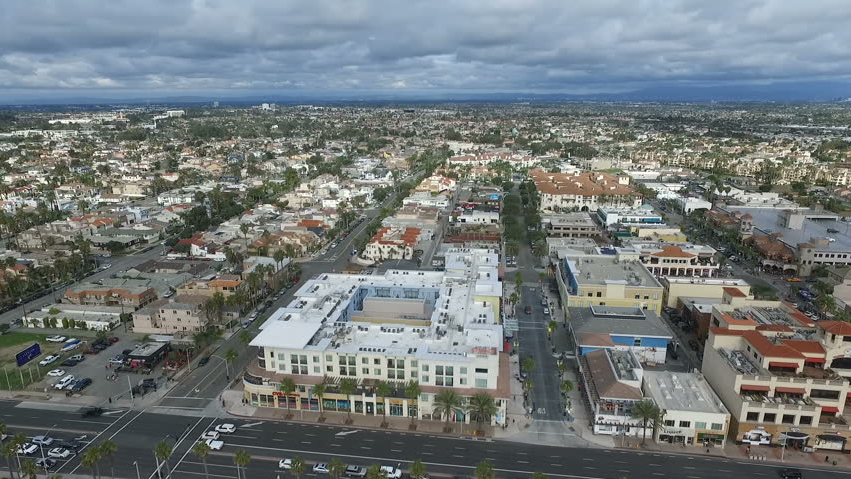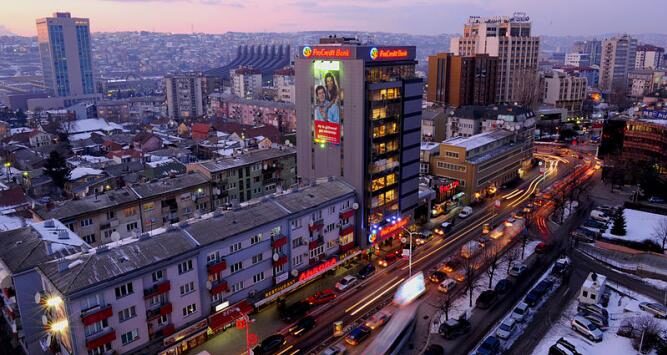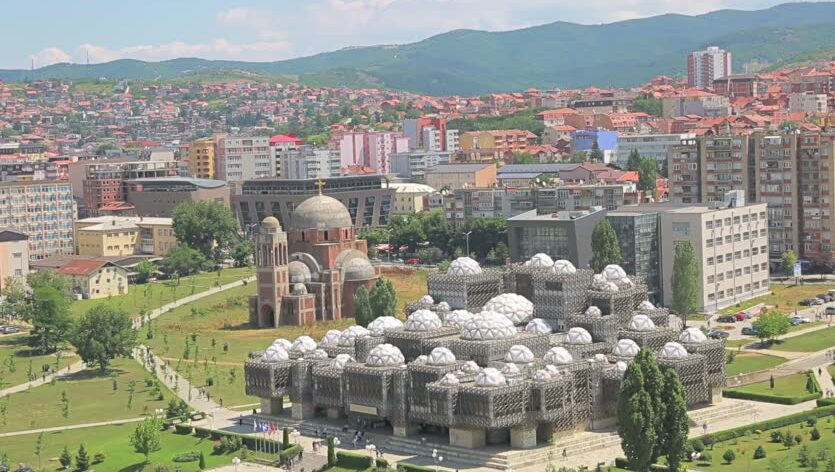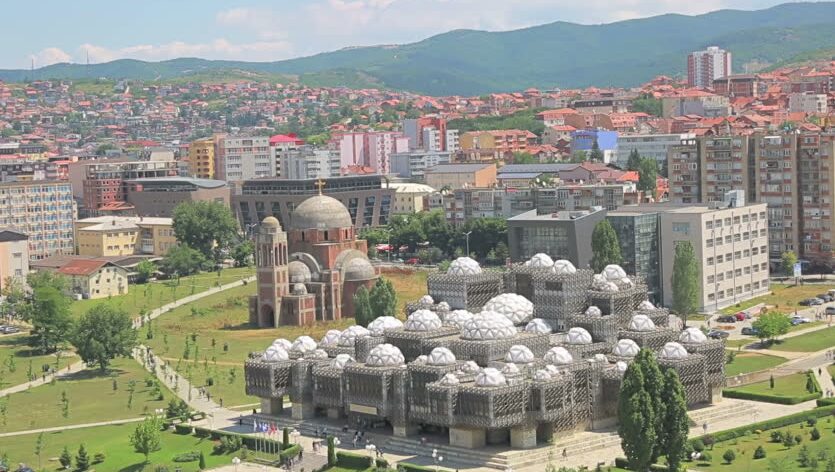Capital of Kosovo:
Pristina, the capital of Kosovo, is probably one of the ugliest cities in Europe. A concrete arrogance of the communist era in the former Yugoslavia damage caused by NATO bombing in the 1999 war, and some architectural monstrosities new plant is a tribute to bad taste come together. But the high take – sculpture recently inaugurated Bill Clinton, a monument to art kitsch in honor of the US president, whose intervention stopped the attempted genocide of the Serbian forces of Slobodan Milosevic. On a pedestal of white marble rises its bronze figure like a cabezón muñegote with the same solemnity that a street mime.
Under the chaotic surface of works and traffic jams have arisen in recent years bars, cafes and restaurants of design and style that have nothing to envy London and Berlin, and a move to the Spanish night. In the pub Moroon can be heard versions of Entre dos aguas or La Bamba, interpreted in plan turbofolk, the frenetic pace of orchestras films Emir Kosturica, or a few streets away, in the Depot, an old workshop windowless hearing To the group Nothing Like the Sun versioning to Coldplay in the same wave. In these live music clubs, thousands of young people drink until the wee hours of the morning, postponing one day more the decision to stay to build the new country or emigrate in search of a future.

Interesting facts about Pristina:
Administrative Data
Seventy percent of Kosovo’s nearly two million people are under the age of 27, and the unemployment rate stands at 40 percent. It is not surprising, therefore, that obtaining a visa to escape is the most precious object for many and that the economic problem is today much more pressing than the ethnic conflict with the Serbian minority.
Economist and professor Muhamet Mustafa points out that the generous foreign investment of the early times is decreasing and that there is a threat of stagnation. “We are growing at around 3% and we need to do it at 7% to create jobs, it is crucial to be transparent and attractive for foreign investment, which is why our integration in Europe is vital.”
You should also know about Seoul Capital City of Korea, South.
Ahmet Shala, Minister of Finance, underlines three challenges: “Energy, education and rule of law.” Kosovo only has a polluting lignite power plant and investment in the energy sector takes the lion’s share of the budget. And it points out another problem: the difficulties that Serbia poses to its exports. “I hope the EU sends a clear message to Belgrade on the agreements on the free movement of goods and people.”

As regards corruption, in which many Kosovars implicate the international organizations operating in the country, the minister asserts that “it is a phenomenon common to the Balkan region, and probably smaller in Kosovo” than in other countries of the Balkans. South Europe. In spite of all these open fronts, Shala is optimistic and believes that in the end the Kosovars will create a “multiethnic and democratic state”.
Maybe. At the moment, the priority for many of them is to get a visa to leave the country, and not only among the young. There are half a million Kosovars working abroad, most in Germany and Switzerland, and the remittances sent by emigrants account for 15% of the young nation’s GDP. Nezrail Qahili, 59, is the head of a family in a farm in Lubishte, a village south of Pristina. Dedicated to subsistence farming, the family lives on what is sent by its brother, who works in construction in Slovenia, one of the countries most involved in the future of Kosovo. “Independence has been a good thing,” says Qahili, “but now the problem is that there is no work, we used to be a big family and we had more income.Now we do not have enough.That’s why there are so many illegal businesses,
In Lubishte, next to the new school and mosque built by international aid, is the cemetery. In a corner, at the foot of a mast with a tattered Albanian flag of the two-headed eagle, two tombstones recall “the martyrs of freedom” and “the victims of Serbian terror” during the 1999 conflict. But Qahili does not seek “revenge against The Serbs “, but work or at least visas to emigrate.
The landscape and history change in Mitrovica, north of the capital. The city of about 85,000 inhabitants, 50,000 of them Serbs, is divided physically and ethnically by the bridge over the river Ibar, and has recorded the greatest incidents between the two communities. In the streets of the northern part you can see painted against the EU and in favor of the union with Serbia.

Momcilo Arlov, director of the Center for the Development of Civil Society, is clear: “The independence of Kosovo will not begin to function until Serbia recognizes it.” Arlov, born in Croatia but a former member of the Serbian Army, is pessimistic: “There is no work, there is no future, nothing is produced, corruption is rampant and the only thing that works is thanks to Belgrade.” In addition, he says, life in Mitrovica is chaos because “international organizations, EULEX, UNMIK, KFOR and the Kosovar police have exclusive powers and different mandates, so no one does anything.”
From EULEX, the European mission for the stabilization of Kosovo, the vision is different. They admit that it is “frustrating” the coordination between different international institutions [UNMIK is the UN mission, and KFOR the NATO force], but attribute it to “corruption, crime, smuggling, police, parties And Serbian institutions. ” “Belgrade makes a political use of the situation, for domestic consumption and as a bargaining chip with the international community,” says one of its representatives, who demands anonymity.The former prime minister and former mayor of Mitrovica, the doctor Bajram Rexhepi, believes that “there are many pseudo-patriots, more motivated by money than true nationalist sentiments. The city’s Serbs are hostages to Milosevic’s policy.” He has no reason. The Serbs in northern Kosovo are the remains of the wreck of ultranationalist politics launched by the former genocidal president. Serbs in Serbia use two words to refer to their Kosovo brothers: selak (peasant) and siptar, which means Albanian and is very contemptuous. In Spain it could be equivalent to sudaca to refer to Latin Americans.
In the village of Gracanica, about 10 kilometers from Pristina, there are 13,000 Serbs – before the war there were 30,000 – and it is home to the Independent Liberal Party, headed by Nenda Rasic, Kosovo’s Minister of Labor and Social Welfare, One of the two Serbian ministers of the Cabinet presiding over Hashim Thaçi. “We have agreed to join our institutions, but we do not recognize independence,” he added, adding: “Belgrade offers nothing to the new generation of young people who live here. , Not more words. Security is no longer the priority, it is the economy. ”
Kosovo has passed in little more than 10 years of myth to nation. It is no longer the founding legend of Serbia or the international emergency for ethnic conflict. It is a small, poor, young and new country whose success will be crucial for the future of Europe.












